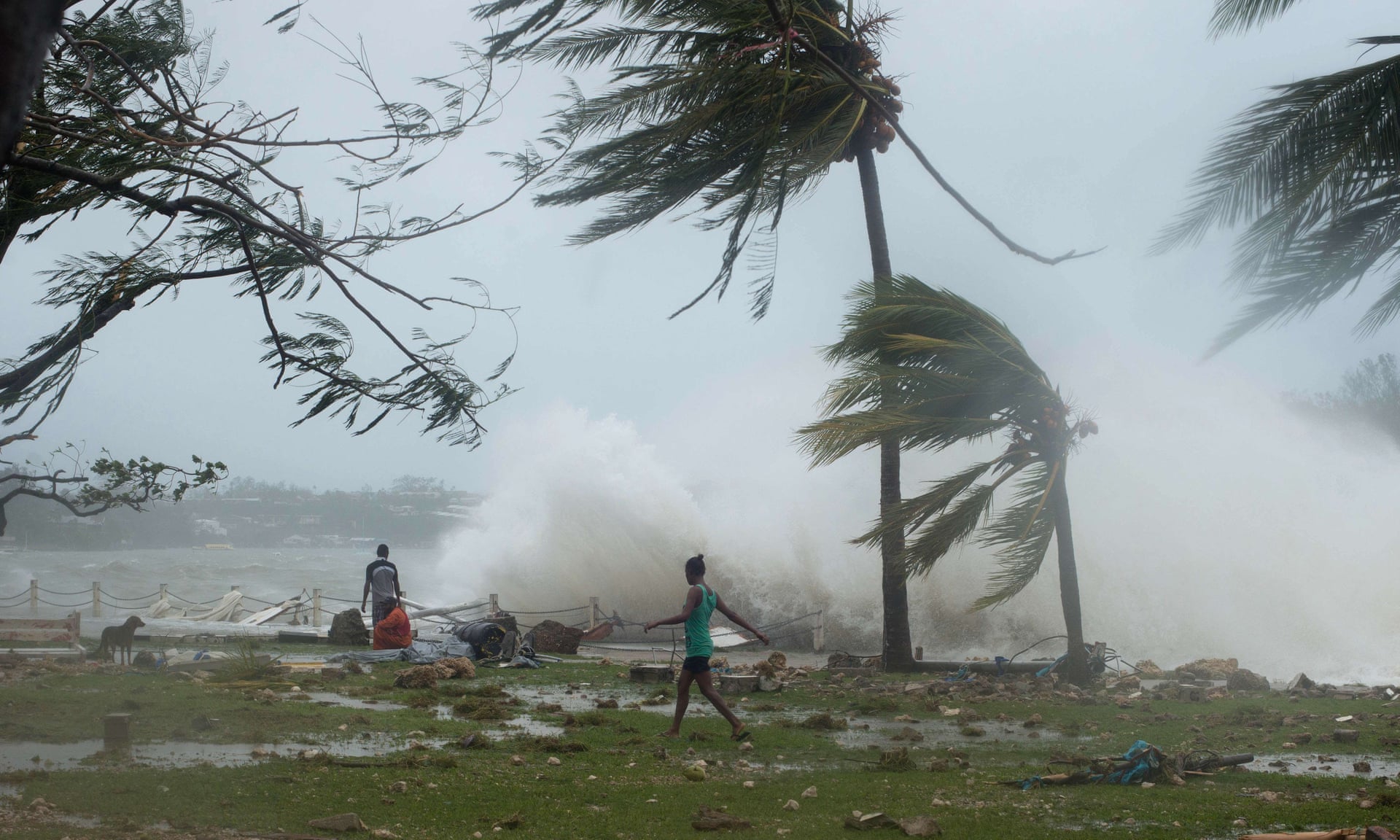Vanuatu says it is desperate for financial assistance to deal with extreme weather and global warming.
Cyclone Pam hits Vanuatu in 2015. Small island countries such as Vanuatu are especially vulnerable to the effects of climate change. Photograph: Unicef Pacific/AFP/Getty Images
The Republic of Vanuatu says it will explore whether it can take legal action against fossil fuel companies and countries for their role in causing climate change.
The Pacific nation says it is growing desperate for financial assistance to deal with the loss and damage it is increasingly experiencing due to extreme weather and global warming.
In a statement on Thursday to the Climate Vulnerable Forum, an international summit focused on those most at risk to the effects of climate change, Vanuatu’s foreign minister, Ralph Regenvanu, said he was putting the fossil fuel industry “and the states that sponsor it on notice that the climate loss and damages ravaging Vanuatu will not go unchallenged”.
Also read: How climate change is plunging Senegal’s herders into poverty
“My government is now exploring all avenues to utilise the judicial system in various jurisdictions – including under international law – to shift the costs of climate protection back onto the fossil fuel companies, the financial institutions and the governments that actively and knowingly created this existential threat to my country,” he said.
No such case brought by a country has been tested but there have been cases brought by citizens in domestic jurisdictions.
Small island countries such as Vanuatu are especially vulnerable to the effects of climate change.
Under the Paris agreement, countries have agreed to limit global warming to between 1.5 and 2C.
The UN Intergovernmental Panel on Climate Change’s recent special reportwarned the planet had only 12 years in which to meet the 1.5C goal and that the damage of even half a degree warmer than that would be far more significant.
Regenvanu told the forum that Cyclone Pam, the tropical cyclone that hit Vanuatu in 2015, wiped out 64.1% of its GDP, or $US449.4m.
He told Guardian Australia that Vanuatu was facing huge costs in trying to adapt to and prevent the impacts of climate change.
“The mechanism that has been but in place by the Paris agreement to assist least developed countries like Vanuatu to adapt and take measures to deal with loss and damage is the Green Climate Fund,” he said.
“Unfortunately countries like Australia who are the big polluters have just announced they will not contribute.
“There is a moral argument to say that to address our loss and damage bill we should be getting that from the people who are profiting off it.”
A global wave of legal action against oil, gas, and coal companies
He said Vanuatu was looking for other countries to join it and would be discussing this at the next conference of parties on climate change in Poland next month.
Vanuatu is home to 260,000 residents and is made up of 82 volcanic islands dispersed across 1,280km of sea. Many of its islands sit less than a metre above sea level.
Greenpeace said the country was on the front lines of climate change.
“Vanuatu’s brave announcement today is part of a global wave of legal action against oil, gas, and coal companies and laggard governments,” Jennifer Morgan, the executive director at Greenpeace International, said.
Richie Merzian is the climate and energy program director at yhe Australia Institute and a former Australian government negotiator to the UN on loss and damage from climate change.
He said Vanuatu’s announcement was a sign of growing frustration among countries vulnerable to climate change over the loss and damage mechanisms within UN climate forum.
“These countries are desperate and they’re looking for support and instead of finding a friend they’re finding a closed door,” he said. “It’s great Vanuatu is looking for every option available to make their case and there are a number of test cases around the world that they can learn from.”
Source: Guardian
Earth’s carbon dioxide levels are likely the highest they’ve been in 15 million years
The plan for a Great Green Wall to beat back the Sahara needs a rethink



